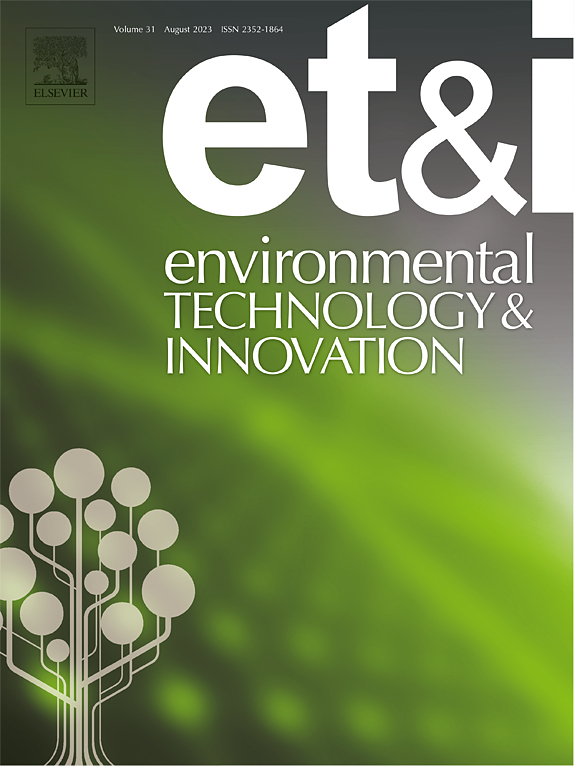Enhancing water retention performance of biochar modified by alkali-treated coal fly ash: Pyrolysis behavior, field simulation, and metal leaching assessment
IF 7.1
2区 环境科学与生态学
Q1 BIOTECHNOLOGY & APPLIED MICROBIOLOGY
引用次数: 0
Abstract
Biochar, produced from biomass pyrolysis, is widely recognized as an effective soil amendment due to its ability to enhance soil water retention capacity. To further improve biochar’s performance, catalytic pyrolysis using coal fly ash (CFA), as a low-cost and promising additive owing to its containing catalytically active minerals, was explored in this study. CFA was expected to enhance pyrolysis efficiency and serve as a soil conditioner. Raw CFA (RCFA) and KOH-modified CFA (KC11) were tested in pyrolysis of rice straw. The addition of KC11 reduced the apparent activation energy (166.19 KJ/mol) of RS pyrolysis and promoted gas production (2.14 ± 0.3 g), while RCFA increased liquid yields. Heavy metal leaching tests suggested minimal environmental risk associated with the application of biochar. The modification increased the potassium content in biochar and enhanced its water retention properties. Notably, while specific surface area (SSA) and hydrophilic functional groups may not be dominant in soil water retention. Soils amended with KC11-derived biochar (B-KC11) extended the first evaporation stage (12.3–19.3 h) and exhibited the highest evaporation mitigation capacity (EMC) (1115.66 hr), which represents the ability to mitigate physical evaporative water loss. A field simulation based on experimental water evaporation profiles confirmed the temperature-dependent benefits of biochar application, and evaporation could be reduced by up to 30.32 % in biochar-amended soil. Overall, this study demonstrates that CFA, particularly in its alkali-modified form, can serve as an effective catalyst and soil amendment, offering a sustainable strategy to enhance biochar’s water retention capacity and agronomic value.
碱处理粉煤灰改性生物炭提高保水性能:热解行为、现场模拟和金属浸出评价
生物炭是由生物质热解产生的一种有效的土壤改良剂,具有增强土壤保水能力的作用。为了进一步提高生物炭的性能,本研究探索了粉煤灰(CFA)作为一种低成本且具有催化活性的添加剂。CFA有望提高热解效率,并作为土壤调理剂。研究了粗CFA (RCFA)和koh改性CFA (KC11)在稻秆热解过程中的作用。KC11的加入降低了RS热解的表观活化能(166.19 KJ/mol),促进了产气(2.14 ± 0.3 g),而RCFA提高了产液率。重金属浸出试验表明,与应用生物炭有关的环境风险极小。改性提高了生物炭的钾含量,提高了其保水性能。值得注意的是,虽然比表面积(SSA)和亲水官能团可能不是土壤保水的主要因素。经kc11衍生生物炭(B-KC11)改性的土壤延长了第一个蒸发阶段(12.3-19.3 h),并表现出最高的蒸发减缓能力(EMC)(1115.66 hr),这代表了减轻物理蒸发水分损失的能力。基于实验水蒸发剖面的现场模拟证实了生物炭施用的温度依赖性效益,在生物炭改性的土壤中,蒸发量可减少高达30.32% %。总的来说,本研究表明,CFA,特别是碱改性形式的CFA,可以作为有效的催化剂和土壤改良剂,为提高生物炭的保水能力和农艺价值提供了一种可持续的策略。
本文章由计算机程序翻译,如有差异,请以英文原文为准。
求助全文
约1分钟内获得全文
求助全文
来源期刊

Environmental Technology & Innovation
Environmental Science-General Environmental Science
CiteScore
14.00
自引率
4.20%
发文量
435
审稿时长
74 days
期刊介绍:
Environmental Technology & Innovation adopts a challenge-oriented approach to solutions by integrating natural sciences to promote a sustainable future. The journal aims to foster the creation and development of innovative products, technologies, and ideas that enhance the environment, with impacts across soil, air, water, and food in rural and urban areas.
As a platform for disseminating scientific evidence for environmental protection and sustainable development, the journal emphasizes fundamental science, methodologies, tools, techniques, and policy considerations. It emphasizes the importance of science and technology in environmental benefits, including smarter, cleaner technologies for environmental protection, more efficient resource processing methods, and the evidence supporting their effectiveness.
 求助内容:
求助内容: 应助结果提醒方式:
应助结果提醒方式:


